Bells Toll For My Youth: A sweet pool Review
Posted Mar 15, 2020 Last modified May 3, 2025
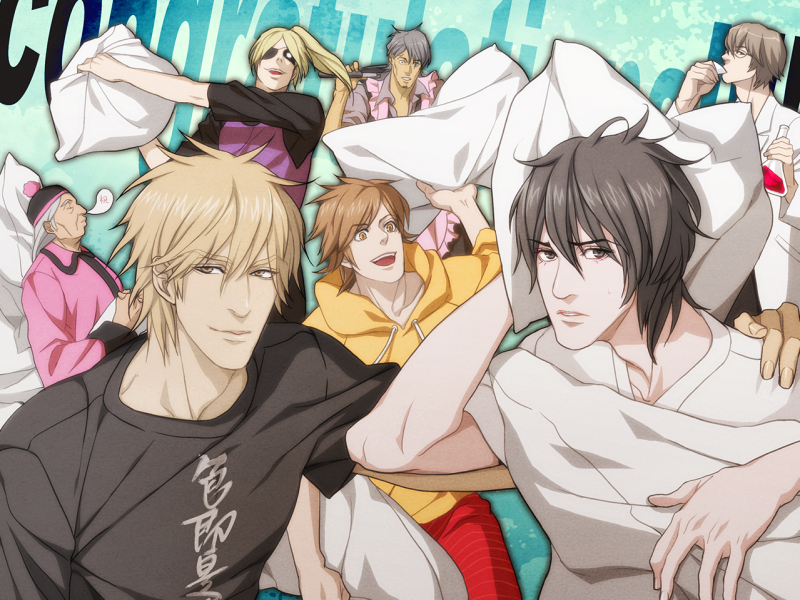
Completing my playthrough of sweet pool was not only my first time playing a BL game, but was the first VN/dating sim that I've played in which saving at crucial decisions eliminates the need for you to re-do the first half of someone else's route later. I learned the art of a timely save the hard way by not saving during Makoto's route in one instance and, tragically, only making one save that got corrupted and was unusable in another instance. Since my quicksaves also refused to load at one point, I bet you can imagine the sheer number of hours I spent toiling away at this game. If I have to hear Makoto say 'Omega Meat Burger' one more fucking time, I'm going to McFricken lose it.
All that is to say, part of the reason for my delay posting the review was me being a huge fucking n00b to the genre and not knowing wtf I was doing. If I didn't have such a longstanding history with this story, I'm not sure I would have had the will to survive, so it's good that the bulk of my trial and error happened this go around and not with a different game. Imagine fucking up your saves during Lamento or something. Christ.
Anyway, it turned out to be serendipitous that I took so long, since I trolled the JUST USA website for shits and gigs immediately after finishing the game and discovered that Togainu no Chi was released on February 25th [2020]! Yes, I already bought it, so my blog has more BL game content on the horizon.
Before posting this review, I recommend that everyone give 4shiki's review of sweet pool a look. I genuinely have no idea how much I ripped her off just by accident after years of living and breathing her review. Please note that I did deliberately use some of her diction here based on the assumption that readers are familiar with her body of work and would thus understand I was making references and hopefully coming across as paying homage.
Without further ado, let's just dive right in, shall we?
Plot Summary
This game depicts scenes of sexual assault, mild gore, abusive family dynamics, and cannibalism.
What is this game about, you ask?
To put it accurately yet crudely, our protagonist Sakiyama Youji, starts shitting meat monsters from his bum bum one day.
4shiki, BL Game Review - sweet pool
But what the fuck does it mean and how did we get here? Even though you learn the bulk of this info by playing through Tetsuo's routes, we'll work backwards and set the scene for this universe from the get-go just to make things a little easier on ourselves. Crack open your Bibles, bitches, because we have to visit the Old Testament God to understand this one.
So, in the world of sweet pool, there's this weird pseudo-Christian cult called The Liberated that worships these things that look like piles of wriggling raw meat or entrails—in short, they're gross. Turns out the sentient meat piles are people who were forsaken by God at the time He destroyed Sodom and Gomorrah. They have been cursed to be born in formless and inhospitable bodies—the nasty guro meat—and reproduce parasitically using human hosts.
Because this is a BL, the human hosts can only be male, so there are men walking around whose meat parasites turn them into Females and Males. To be clear, becoming "infected" doesn't change the biology of the Hosts or anything, they're just Males and Females in the context of meat monster reproduction.
There's a whole slew of terminology for different meat things and some explanation for how you become a Host, but it doesn't really matter for the plot, so we're skipping it. What's important to note is that someone can be a Host and not know, since Male Hosts can mate with human women and pass along their meat parasites to their kids.
Anyway, The Liberated are hell-bent on getting a perfect Female to mate with a perfect Male in order to birth a Purebreed, which is like the meat Messiah. Problem is that Females are super rare, so there's a shit ton of Males walking around just waiting for a Female to make herself known. Females send out pheromones and also shit out what's called Markmeat to alert Males that they're single and ready to mingle. And so we're back to where we started–our protagonist shitting meat monsters out of his bum bum one day.
Sakiyama Youji is a sickly high school student who's been held back a year due to frequent hospitalization. I get the sense that he was kind of a loner before getting held back, but being the weird older guy who's constantly absent really compounds that issue in the present. This isolation from his peers is reflected in our limited options of dudes with whom to hook up in the game.
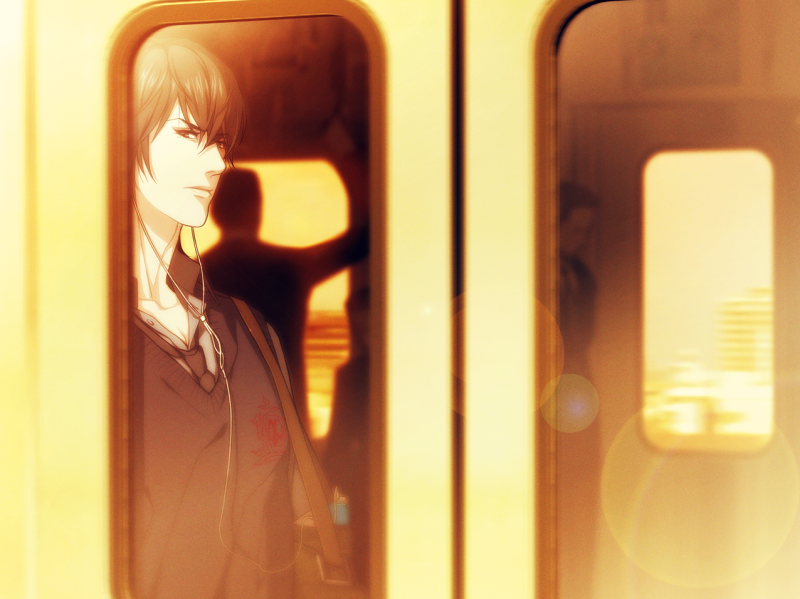
Our choices of men include Okinaga Zenya, unhinged third year yakuza son who's got… issues, and Shironuma Tetsuo, mega hottie smarty pants tall boi, who are both Male Hosts; and then Mita Makoto, an annoying loser with orange hair who's really the only person in his class who gives a shit about Youji before he starts menstruating meat. Makoto isn't a Male, but still gets caught up in this whole meat monster mess because he is sensitive to Youji's pheromones regardless.
As to be expected, we play most often from Youji's point of view. It's pretty obvious that Tetsuo is the guy with which Youji is supposed to end up on account of him having four of the six total endings for the game, so I hope you like him or you're in for a bad time!
I only have eyes for Tetsuo, but this ain't the worst rogues gallery I've seen.
The game begins on Youji's first day back from the hospital, where he's been since collapsing at his school's opening ceremony back at the start of the academic year. Upon walking into class, we are immediately accosted greeted by Makoto, who drips creamsicle all over our fucking desk. Soon after, we get our first glimpse of Tetsuo. Youji notes that Tetsuo has a sweet smell (the pheromones), but reveals he's actually super put off by him because Tetsuo seems to have a staring problem.
Later that day, Youji and Makoto go to head home and have to watch Zenya make an ass out of himself on the school gates before the Okinaga driver/butler/bodyguard Kitani comes to collect his mans. When Youji arrives home, he gets a call from his sister, Erika, who wants to know how he's been feeling. We learn that Erika is married and due to give birth soon, and that Youji has decided to live alone despite the offer from Erika and his brother-in-law to move into their home. Calls or emails with Erika crop up throughout the game and serve to help Youji work through his awkward relationships with Tetsuo and Makoto.
He doesn't tell Erika about Zenya, which is understandable since the levels of weirdness and harassment with which Youji has to put up from that corner would freak her the fuck out and have her calling the police instantly. Zenya is like dealing with that weird wolf or vampire kid in high school… you're not telling your mom because where do you even fucking start? I think the very next day at school is when Zenya tries to psych Youji out by mutilating his tongue on a drink can, so yeah. Try explaining that one to your family.
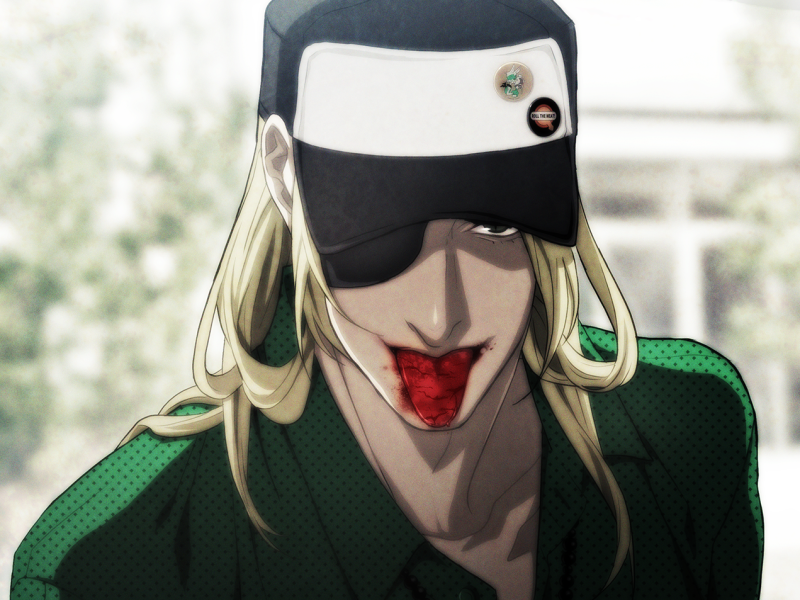
On the way to school the next morning, Youji nearly collapses on the train right before his stop, but is grabbed and supported by a stranger. He is soothed by the stranger's heartbeat before the train arrives at his destination.
That same day, Youji learns that he's been put on cleaning duty after school and is mortified that he ditched the day before without realizing. He's dismayed to learn that he's cleaning up with Tetsuo, and does his best to hurry on out of there. For some reason, Tetsuo feels compelled to touch Youji on the neck in the middle of doing chores.
Perturbed, Youji scurries off with Makoto to an offbrand fast food joint (it's McDonald's) and we're forced to listen to Makoto recount a bunch of rumors—none of it interesting—including one about how Zenya disappears every day at 5pm when the school bells chime this particular song. Youji and I are sitting there like:
Youji escapes Makoto's insufferable conversation and goes home. While he's in the bath, he starts to think about cleaning duty with Tetsuo and feels out the spot where Tetsuo touched him earlier that day. Youji is shocked to find something slippery there, and pulls his hand away to discover that it's blood. Convinced that Tetsuo must have seen the blood on his neck earlier, Youji realizes that the bath water has turned blood red as well.
Although he's freaked out like a normal person, Youji is overcome with inexplicable lust and starts jerking it in the literal bloodbath. Post-nut clarity reveals that Youji was just hallucinating… probably, since the water now looks completely normal.
After his masturbation session, Youji starts getting obscenely horny at inopportune times and feels incredible shame about it. Can't say I blame him since he goes to Catholic school… not that I ever did, but I have a history of assimilating Christian shame into everything I do as a New English girl who went to 75 million churches with her family and friends growing up, so… been there buddy.
There's a very funny scene—although I don't think it's supposed to be funny—where Youji gets so horny alone in the chem lab after school that he jerks it right there like a middle schooler… of course, Tetsuo catches him in the act. In fact, he starts crossing paths with Tetsuo all the time, despite doing everything in his power to avoid him.
Along with being horny, though, comes the time for Youji to start menstruating meat from his ass. What follows is Youji doing his best impression of Somethin' from Flavor of Love for pretty much the remainder of the game:
We discover that the boys bathroom at Komanami Academy would be the ideal place to take a shit, since no one ever seems to fucking interrupt whatever weird stuff is doing down in there–not Youji shitting out meat and just leaving it on the floor, not Zenya coming in to play with the meat that Youji shit out and left on the floor, and not Tetsuo unconsensually touching Youji's butthole to coax some meat to come out and plop on the floor. Somehow all of the above happens in the bathroom without interruption! How??? In my high school, a bitch got caught snorting oxy off the toilet seat on day one. I guess private school really is something else.
We periodically break from Youji's POV to see what's going on in the Okinaga household, and babes, is it the apotheosis of not good. Kitani doesn't know anything about the meat monster worship, so he's basically our POV character with the Okinagas as he tries to puzzle out wtf is up with his master and little master. Zenya's daddy Kunihito, crazed ex-yakuza boss who physically and verbally abuses his son, is zealously affiliated with The Liberated and worships a big ass chunk of meat in his basement, which is supposed to be all that remains of the last Purebreed.
I guess Kunihito force fed Zenya some meat off this Purebreed meat chunk when he was a kid, which turned him into a defective Male instead of a perfect one. Every day at 5pm, his meat parasites fuck up his insides, causing him intense pain… turns out Makoto's rumor about Zenya disppearing when the bells chime is true. The narrative purpose of all this is that we essentially find out what the hell is going on with Youji by learning about Zenya.
Defective or nah, Zenya is still a Male who wants nothing more than to get his hands on Youji, the only Female around these parts. He asks Kitanti to do some reconn on Youji in an unsettling scene where Kitani is forced to lick his guro eyeball. Just insert the Waka Flocka GIF again because what the actual fuck.
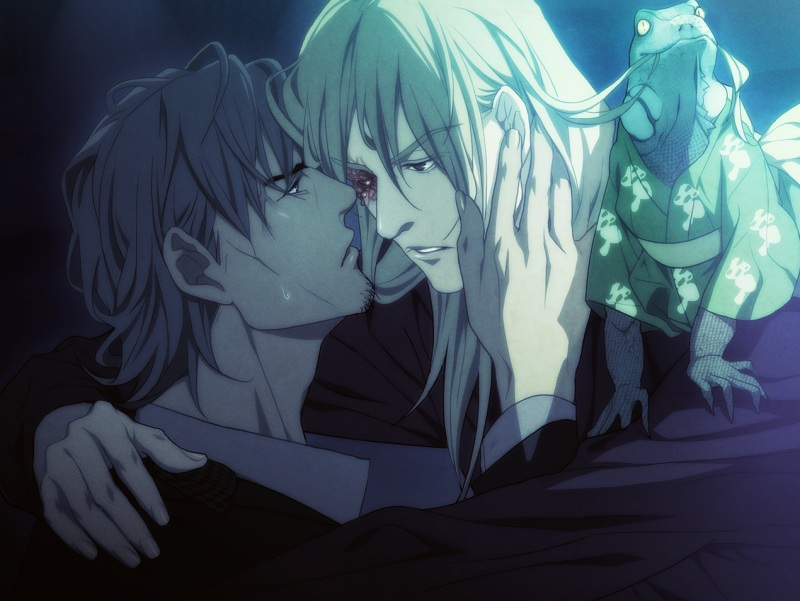
To test his hypothesis that Youji is a Female and that Tetsuo keeps hovering around him because he's also a Male, Zenya kidnaps his two classmates and locks them in a shed with a staticy TV and incense that makes meat Hosts horny. Youji wakes up, sees Tetsuo, gets horny, touches Tetsuo on the face and kisses him. Tetsuo wakes up mid-kiss, flips Youji over, and gives him a lil handy—aw!
A few hours later, Youji wakes up in the trash area outside of his apartment. It's around this point in the game that, if you've been playing Zenya's route, the next day he'll promise to tell Youji everything about what's going on with his body if Youji comes to his house. You'll be given a choice to leave school with him. Agree to do so and you trigger the VLG ending.
VLG
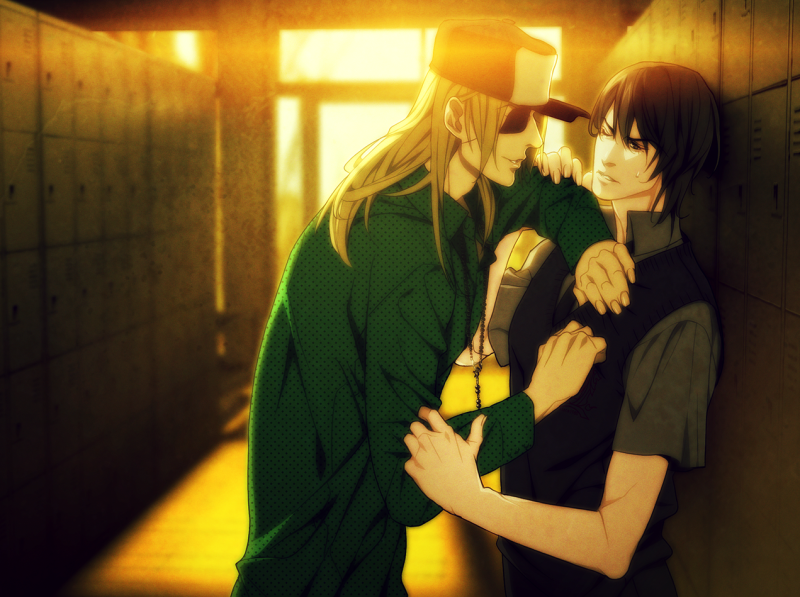
Youji doesn't want to miss a chance to figure out what's been going on with him and agrees to leave with Zenya. On the car ride to his house, Zenya mocks Youji for being so trusting and knocks him out—Youji's been had. Youji wakes up in the same TV shed as before, but this time he's all tied up. Zenya does the bare minimum explanation of the meat monster situation and proceeds to serially rape Youji for a long periololically time. It's basically a sex slave ending.
Youji loses his sense of reality, refuses to eat, and is forced to make "babies" with Zenya for long into the foreseeable future. Zenya seems similarly out of touch with his humanity, as in he's very much a slave to making babies with Youji himself. We're left to assume that Youji starves to death or something. It's a harrowing ending to live through and you'd have to pay me money to play it again.
If you're not balls deep in the Zenya route, then you get to progress further in the story. Zenya is big mad because he didn't find out what he wanted to know about Tetsuo, so he's even more pissed that Tetsuo is sniffing around his Female. Zenya lures Youji behind the school under the guise of telling him more about being a meat Host, but Tetsuo shows up before Zenya can escalate things.
What follows is a bunch of machismo shit that I wish I could say didn't get my heart throbbing for Tetsuo, but it did so I just have to live with myself. The pissing contest between Zenya and Tetsuo is interrupted by the 5pm bells and Zenya is forced to run off as his meat parasites tear him a new one.
Now alone with Tetsuo, Youji initially feels relieved, but catches a vibe from Tetsuo that gets his anxiety levels up again instantly. He is right to panic because soon enough Tetsuo pushes Youji up against the wall and has his way with him.
The whole being Female and Male thing works in their favor and Youji is at least able to feel pleasure during the encounter, but I'm still not thrilled about it… I would have much preferred for Youji to be the one overcome by lust who starts initiating it (like back in the shed) and then regrets it later, as opposed to Tetsuo taking Youji as spoils of war after the most nothing fight at school. But this is a BL from 2008, so we unfortunately have to deal.
In the aftermath, Youji feels physically ill. He gets a text from his sister about how she gave birth and he manages to reply before collapsing on his bed. In an ironic inversion of Erika's childbirth, Youji is up all night expelling meat from his asshole; his parasitic children are crawling all over the apartment in the few moments in which he regains consciousness. Giving birth is more than a good enough reason to be absent, so Youji skips school the next day.
That afternoon, Tetsuo comes a-knocking on Youji's door, which prompts our protag to flip the fuck out at him—understandably—but he feels foolish when Tetsuo reveals that their chem teacher and maybe also homeroom teacher Kamiya forced him to pass long the homework for the day. Youji can't help but laugh at the entire fucked up situation.
Youji feels well enough to go to school the next day, only to find campus in an uproar over the fact that Tetsuo punched Zenya's lights out and got his ass suspended. We later learn that Zenya goaded Tetsuo by calling Youji a freak, so it's all really very sweet. The roles are reversed and Kamiya forces Youji to bring Tetsuo the day's homework. When he gets to the Shironuma residence, Youji is greeted warmly by Tetsuo's mom, who promptly invites him to dinner. Unable to refuse her kind offer, Youji breaks bread with his mans that night.
Up until this point in the game, there are a few moments that break into Makoto's perspective, which usually just hash out his angst over the fact that Youji won't open up to him and accept his full friendship. The Tetsuo and Youji homework delivery situation pushes him over the edge—he's offended that Kamiya picked Tetsuo to deliver Youji's homework when Makoto is clearly the only guy in class who talks to Youji.
In general, Makoto just acts super bitchy about the fact that Youji and Tetsuo have been spending more time together. His inner turmoil escalates to an obscene degree even from his perspective, and he finally comes to the conclusion that he doesn't like Youji, he like likes Youji. This bodes ill for our protagonist, who's already struggling to avoid the advances of Tetsuo and Zenya.
Makoto wastes no time publicly embarrassing himself once he realizes he's gay for Youji and throws a temper tantrum the next day when he sees our heroes talking to one another. Kamiya has to restrain Makoto from getting physical and both he and Tetsuo get in trouble. When Youji is called in to explain the situation to Kamiya, Youji learns that both his classmates vouched that he had nothing to do with the fight. Kamiya goes on to explain that Tetsuo is being forced to tutor Youji—who's failing btw—as recompense for all the scuffles in which he's been involved lately.
School lets out that day and it's raining, but Youji doesn't have an umbrella. Tetsuo, whose mom sent him to school prepared for the weather, approaches him to discuss when and where their tutoring sessions will be happening. Realizing that his lady love is unsheltered from the rain, Tetsuo walks Youji home with his umbrella. 🤭
When they arrive Youji instinctually grabs Tetsuo's arm before he can walk off, but Youji doesn't really have anything to say and stands there awkwardly. Tetsuo pulls Youji close and apologizes for treating him so roughly, alluding to the sex they had behind the school. It's not much, but at least he's somewhat remorseful.
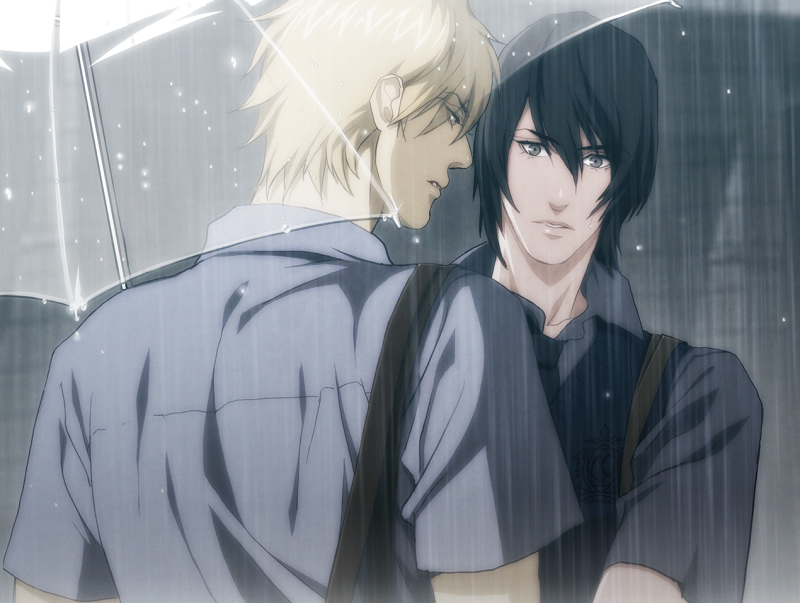
Later that evening, Youji gets another surprise knock on his door. He opens up to see Makoto dramatically standing in the rain sans umbrella looking very gloomy. Youji is deeply concerned and asks if Makoto wants to come in and use his shower or get a towel or something. Instead of reacting like a normal person, Makoto loses his mind, spouting all this crazy jealous shit.
Makoto manages to get himself under control, but still yammers on about "why can't it be me" before running off without giving any explanation for what the hell just happened. Since Youji is surrounded by psychos at this point he's just like okayyyy and goes back inside.
Meanwhile, Zenya's becoming progressively more unhinged himself. We flashback to Zenya prowling the halls of school after getting his ass beat by Tetsuo. Kamiya passes him by and quietly calls him defective before chuckling and walking off, meaning that the teacher's been in on the meat cult shit the whole time!! Makoto may be wrong about a lot of shit, but he was onto something when he thought it was weird for Kamiya to ask Tetsuo to give Youji his homework and not him. Kamiya's nasty ass has been orchestrating meetings between Youji and Tetsuo for the whole game.
Speaking of orchestrated meetups, Youji and Tetsuo have a tutoring session at Tetsuo's house during which not a lot of studying gets done. They don't fuck or anything, just share an intimate moment napping together, which I think is really fucking cute.
The next day at school, Youji is greeted by Makoto along the same welcoming lines as the first day when he dripped creamsicle on our desk. He apologizes for making a scene at Youji's house the other night and makes plans to rendezvous with Youji at the chem lab. Youji is glad to see Makoto back to his usual self, but is unsettled by the fact that Makoto isn't smizing.
Despite some misgivings, Youji keeps his word and heads to the chem lab after school to meet Makoto. As he walks in the room, he's grabbed from behind and pinned to the ground by a tweaked out Makoto holding a box cutter. He starts prattling on about Tetsuo and how Youji's scent drove him crazy and now he wants Youji to himself.
Enraged that Youji isn't saying anything, Makoto angrily demands that Youji choose between him and Tetsuo—if Youji remains still, that's a yes for Tetsuo, if he nods that's a yes for Makoto. If you're playing through most of Tetsuo's routes, you won't be prompted to make a choice here and stay still by default, but you have the choice to nod your head if you've been playing through for Makoto, which triggers The Hunger ending.
The Hunger
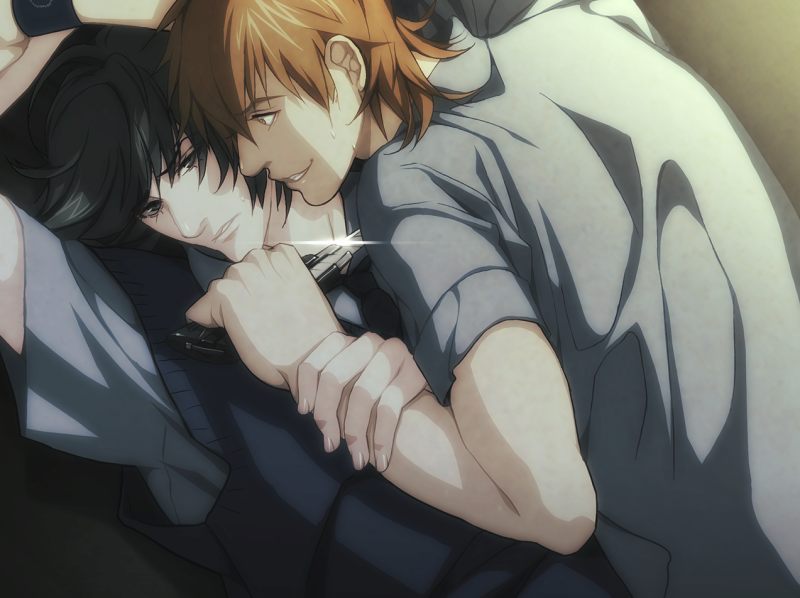
In an attempt to appease the crazed Makoto, Youji tells him what he wants to hear and nods. However, Makoto is beyond appeasement since he's already decided that Youji doesn't like him, and thus Youji is injured and raped by his former friend.
You can definitely tell that I come from an era when rape was just a whatever commonplace happenstance in my BL media because I fucking gagged in the lead up to the sexual assault. Makoto says the funniest, one-sided shit before he gets to it, marveling at the fact that he can get an erection in response to another guy and going on about how he must really be gay. It wasn't funny, but I have to say it was pretty funny. I've honestly replayed this ending once already just to hear the dialogue.
After assaulting Youji, Makoto is licking on Youji's body and gets a taste for his flesh after nibbling on his open wounds (mmhmm, it's going there). Makoto stabs Youji and starts to eat him alive, Markmeat and all. 🤢🤢
Makoto snacks on Youji's body for an unknown period of time—probably not too long since Erika isn't looking for her brother—and is just all around not present. 4shiki says he looks like a zombie and uh huh, yeah, that's it.
Cannibalizing Youji wasn't enough to sate his hunger and he's started to gnaw on his own arm to abate it. He's really fucking sad and lonely now that Youji is gone and wants to hang out with him again. Fully cognizant that the reason he can't see Youji is his own damn fault, he softly weeps before the credits roll. And once again, this game got me sitting there like okayyyy…
If you don't nod in response to Makoto, the story continues. Makoto keeps babbling on by himself about how he's a giant fucking dumb ass if Youji didn't even consider him a normie friend on top of not reciprocating his lust love. Youji is way too out to lunch during this whole scene because his reasoning for not nodding is like a philosophical mediation on how he doesn't know what "friends" are and I'm just like "Youji, it's really not the time, just say you're friends even if you don't want to go out wtf is wrong with you??"
Anyway, like a lot of men so entitled that it causes brain damage, Makoto says he's gonna murder-suicide because his love isn't returned and raises the box cutter for attack. Youji mentally calls out for Tetsuo and prepares to die. Before Makoto can strike, Tetsuo is on his ass, getting Makoto off his man. Makoto blames Tetsuo for the whole situation before running away, my guess is looking like this:
After school, Youji and Tetsuo makeout to add insult to injury for little Makoto. Next day, Youji goes to school to find the place in an uproar yet again because Makoto attempted suicide the night before. Guilty, sad, and in desperate need to talk this shit out, Youji skips the rest of the day and heads to the hospital to visit his sister, who's still recovering from giving birth. Like Youji, she's frail, so labor was a pretty big health risk for her.
At the hospital, Erika fills Youji in on his own tragic backstory. Erika tells Youji through tears that he died in the car accident that killed their parents as children, but miraculously recovered. The bodies of their parents sustained a lot of physical trauma, but Youji was untouched save for a scar on his chest. During Youji's recovery, Erika remembers him telling her that his dad's body came apart in little pieces that fell into the hole in his chest. We're left to infer that their father was a Host whose meat monsters healed Youji and turned him into a Host. Before leaving his sister, she shows him his nephew, named Yuuji—Yuu from her husband's name and Ji from Youji. Very cute!
Youji goes to leave the hospital but thinks he spots Kamiya somewhere in the lobby. Remembering that Makoto is probably recovering from his suicide attempt in the same hospital, Youji asks staff to direct him to Makoto's room. When he gets there, Makoto initially freaks out thinking that Youji is there to kick his ass, but he assures Makoto that he's just there to have a heart to heart. Makoto apologizes for his actions and Youji apologizes for not being a better friend to Makoto. They leave agreeing to remain friends. The conversation is actually very sweet and made me warm up to Makoto ever so slightly.
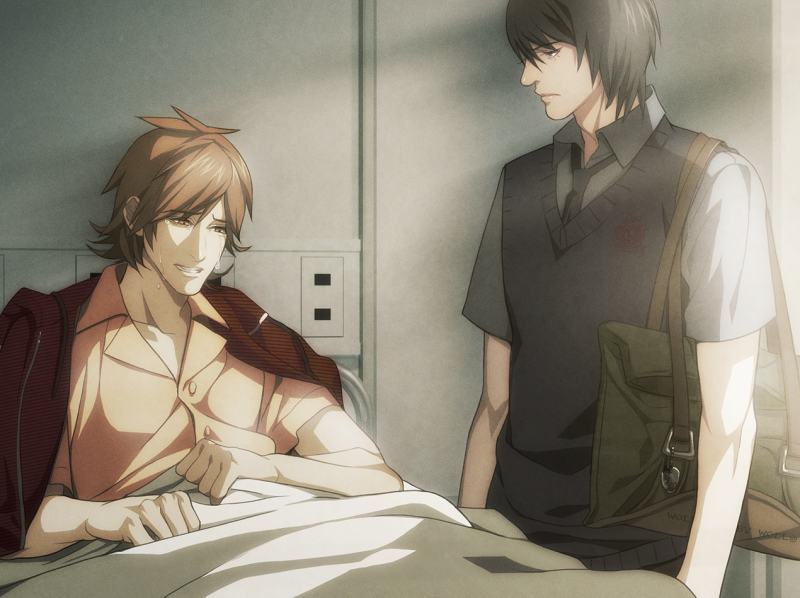
Uh oh—on his way out the hospital, Youji runs into Kamiya. His teacher is acting like an even bigger weirdo than usual and starts off their conversation talking about how he can't keep covering for Youji. This makes no sense to Youji of course, so Kamiya decides to expose himself as being part of The Liberated and reveals some of the meat monster mating situation in an attempt to get Youji to come under the cult's protection. In response, Youji gets the fuck outta there and heads to Tetsuo's house for tutoring.
After a long day of talking about his feelings, Youji decides to keep up the momentum and talk to his boyfriend about his feels. He talks about how he used to think Tetsuo was weird as fuck, but doesn't know quite how he feels anymore. When he asks how Tetsuo feels about him, he starts making out with Youji in response, and eventually tells him that he "found Youji first" and that he's not letting anyone else have him for that reason. 😳😳
Our boys partake of some afternoon delight. The afterglow of sexy time is dimmed slightly by Youji's need to pshit out a meat monster. In a moment as touching as it is fucking disgusteng, Tetsuo holds Youji's legs apart and forces it out when Youji initially tries to hold it in out of embarrassment. Afterward, Tetsuo embraces Youji before helping him clean up the mess. While in Tetsuo's embrace, Youji hears the thudding of his heart and realizes that Tetsuo was the stranger that helped him when he was sick on the train. On the way home that night, Youji is giddy with happiness and a sense of belonging.
Next day is Founding Day at Komanami Academy, so there's no school. Youji is surprised to receive a text from Zenya to come to school anyway, so he can tell Youji everything. Although satisfied in his bond with Tetsuo, Youji can't help but feel curious and heads out to meet Zenya.
When he gets to school, it's absolutely covered in meat monsters but for some reason he doesn't take that as a sign to fucking leave. Instead, Youji heads to the chem lab and Kunihito is there babbling about how he's going to sacrifice Youji to his chunk of meat to restore him to his former glory.
Kunihito calls Zenya out to kill Youji—he has his eyepatch off, his guro eyeball is exposed, and it really seems like he's going to fucking do it. At the last second, Zenya turns on Kunihito, let's out all his feelings about how this meat shit ruined his life, and stabs his father and his chunk of meat. When he's done with that, Zenya turns to Youji and carries on like he's going to kill him anyway. Our man Tetsuo bursts in to save the day yet again and Zenya asks him how hard it is to check his fucking email. Appears Zenya set up this whole thing to have a final showdown with the Female as prize.
Unshockingly, Tetsuo kicks Zenya's ass but is stopped by Youji before he fully hulks out on Zenya and becomes a murderer. Taking advantage of the distraction, Zenya stabs Youji in the leg. Infuriated, Tetsuo pulls the knife out of Youji and stabs Zenya so badly that his guts fall out on the floor. The game shows it in great detail, but I'll spare you here. After Youji and Tetsuo run off, Okinaga servant Kitani shows up and is horrified to find his master dead and young master dying. He comforts and calls Zenya by name before he passes away.
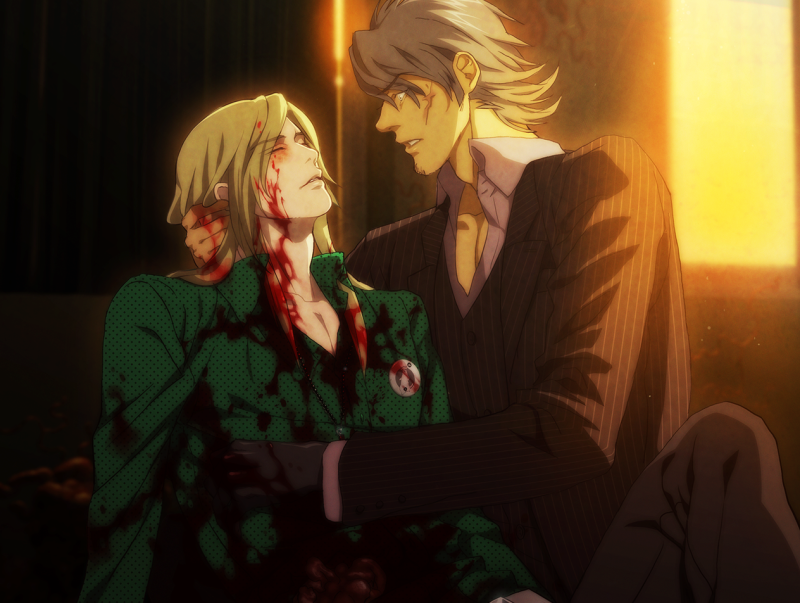
I'm not going to act like I didn't cry for Zenya the first time around, but overall I'm pretty irritated that Zenya dies before he can explain that he was the one who killed his dad and that it's explicitly his fault that Tetsuo gutted him because Youji tried to save his ass. Kitani would have probably still gone after Youji and Tetsuo either way, but maybe he would have thought about it a little if he didn't think they killed his surrogate family in cold blood. Love ya, Zenya, but your final moments really ain't it.
But back to our heros. Tetsuo grabs Youji and says that they're going home. Unfortunately, there's just too much sentient meat everywhere, blocking the exits, so Youji and Tetsuo are forced to escape to the roof.
On the way there, Youji starts to hear voices in his head and realizes it's the meat people. They ask him to understand their suffering and give him the choice to reject his humanity and birth a Purebreed or to continue living with Tetsuo as a human. The answers you give to their series of questions here determines which of the Tetsuo endings you get.
On the roof, Youji and Tetsuo talk about their feelings for one another. No matter what ending you pick, the tone of the conversation reflects Tetsuo's desire to just be with Youji and vice versa. Youji asks Tetsuo if the reason he liked him is just because he's a Female and Tetsuo says yes—but only in the beginning. Tetsuo assures Youji that somewhere along the way he forgot about the instinctual reason he was going after Youji and just kept thinking about how he wanted to be with him—periodt.
Youji explains his initial bad impression of Tetsuo, how he thought he was staring at him because he had a problem with him. Like Tetsuo, along the way Youji began to feel differently, as though Tetsuo might be the only person who understands him. Tetsuo calls him by his first name and the two kiss.

Too bad Kitani bursts in to kill the mood. The choices you made on the way to the roof affect the direction of the conversation you have with Kitani, but either way Tetsuo ends up shot. This is where the four routes deviate. Fyi: the Miracles May ending doesn't become available until you've played the Miracles May (Violin Version) route at least once. In the order of my playthrough:
Diving Deep
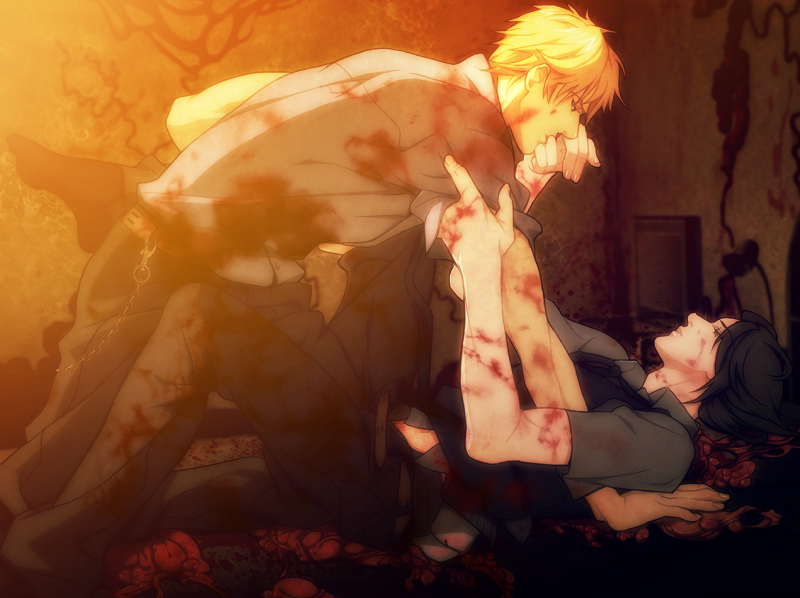
Tetsuo is incredibly badass and pulls the bullet from his own wound, shocking Kitani enough to give our heroes time to run off. Tetsuo and Youji escape the school to find Kitani's car with the keys in the ignition. The two hop in and drive to Youji's house, where they collapse on Youji's bed in exhaustion, seemingly impervious to the meat monsters wriggling all over the apartment. In this ending, Youji hesitates when Tetsuo tries to initiate procreation sex, giving Kitani enough time to bust in and kill them both.
We end this route with Kitani and Kamiya, the latter of whom explains the full story of how Zenya came to be a defective Male Host. Kitani tries to glean more information from Kamiya about The Liberated and their overall goals, but Kamiya walks off before giving him any answers. He leaves with a very "the South will rise again" vibe…
I will say this, however… We will be waiting. One day, a new dawn will rise.
… and I'm just sitting here wondering why the fuck Kamiya of all people gets to live.
Miracles May (Violin Ver.)
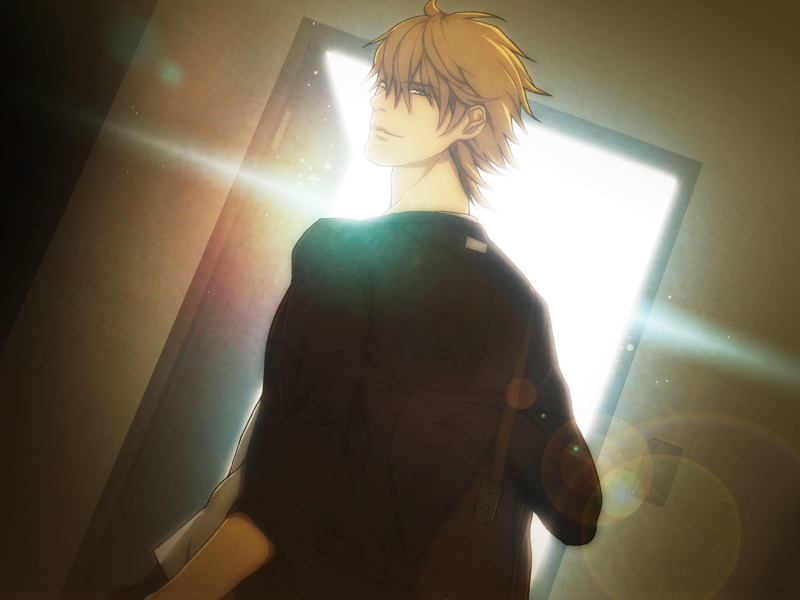
Kitani shoots both Youji and Tetsuo and they fall from the school roof into the pool below. As the two plunge into the water, Youji recalls the accident that took his parents' lives, confirming that his father was a Host who sacrificed his life so Youji could live. Thinking that it's his turn to save someone he loves, Youji holds Tetsuo close.
We do a bit of a time leap a few years in the future–Tetsuo and Youji live together, but it's clear that Youji has been seriously altered from the fall into the pool. As 4shiki argues, he's definitely exchanged his own humanity for Tetsuo's well-being. Youji's health is seriously failing on the day in question and he and Tetsuo discuss leaving the window open while Tetsuo goes to work. Tetsuo smiles brightly at Youji as he leaves for the day and Youji dies with the breeze from the window on his face and wishes for Tetsuo's happiness on his mind.
The Red Road
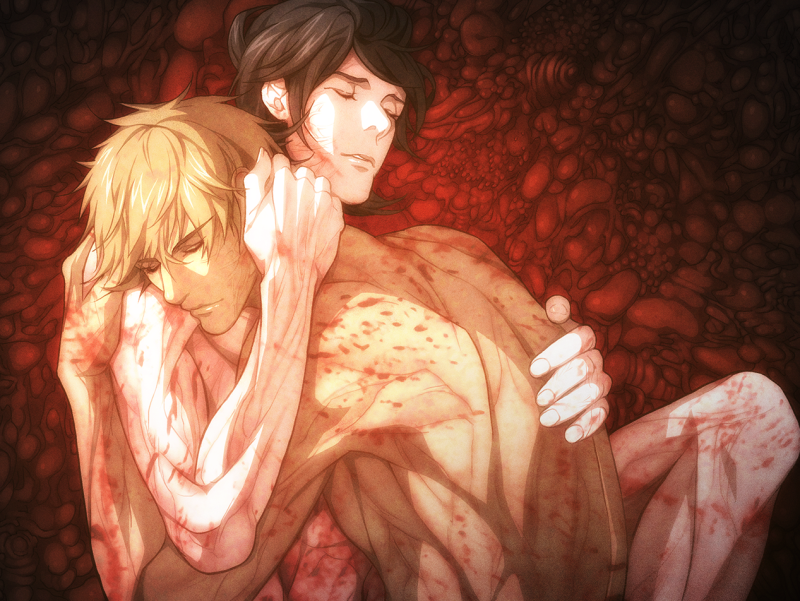
Like Diving Deep, this route begins with Tetsuo pulling the bullet from his wound and running off in Kitani's car to Youji's place. This time when the two collapse on the bed, Youji is ready to surrender his humanity to the meat people and create a Purebreed. Somehow the meat monsters in the apartment aren't enough to turn them off and the two get down to business. They're really feeling it this time and they feel themselves fusing together as they do it as the meat people celebrate.
Before they share a little death, they meditate on the meaning of forever and if it really exists. The two kiss and die, leaving behind their child. Kitani arrives at the apartment and is shocked to find only a kid laying there. When he picks the child up, it opens its eyes—they're red, the mark of a Purebreed.
Miracles May
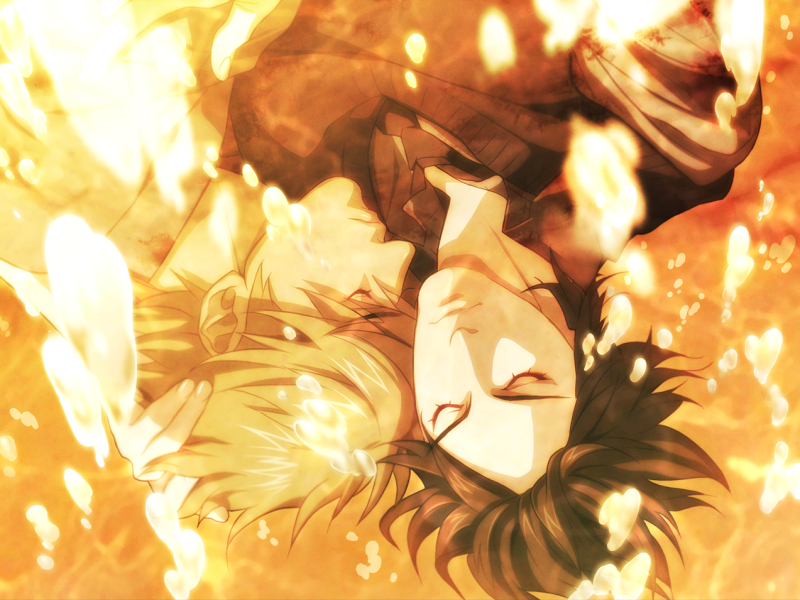
Like Miracles May, this ending begins with our heroes being shot and plunging from the roof into the pool. Youji has the same flashbacks to the accident that killed his parents, but as he thinks it's his turn to sacrifice himself, you're given one last choice. Choose instinct and you continue to the Violin Version, choose reason and you proceed to the true ending. [Since writing this summary, I have learned that the Red Road ending may actually be the "true" ending, while Miracles May is the "grand" ending. However, Miracles May is the true ending in my eyes.]
Youji rebels—he wants to keep on living with Tetsuo. Before he fades from consciousness, he makes a wish to hear Tetsuo call him by his name one last time.
We then jump ahead in time and get the remainder of the story from Tetsuo's perspective. Years after the events at Komanami, Tetsuo is fully recovered from his injuries but still suffers from amnesia—he has forgotten all about the meat procreation stuff and his time with Youji. All he knows about the day he fell from the school roof is that the Okinagas were found murdered in alleged gang-related activity and that his classmate—who he can't remember—transferred away due to family obligations. Before he recounts this part of the story, Youji is described as "his missing classmate," so it's really ambiguous if Youji disappeared, died, or just moved away.
In the present day, Tetsuo is attending a local STEM college in hopes of having a successful career to pay his parents back for the emotional and financial burden he caused them with his hospitalization. He notes how his mother frequently comments on how drastically different he became since the accident. In an attempt to understand the person he once was, Tetsuo starts to deviate from his daily routine. One day, Tetsuo feels compelled to get off the train at Youji's former train stop out of pure instinct—he has a feeling that he will find his other self by doing so.
On the train platform, he gets flashbacks to his time in high school, including vivid memories of Youji, which leads Tetsuo to say his name… one last time. After the credits roll—which everyone sits through on this ending even if you usually don't because you're too busy fucking crying—you're blessed with one last CG of Youji, standing alone on the opposite side of the train platform. Then you cry harder.
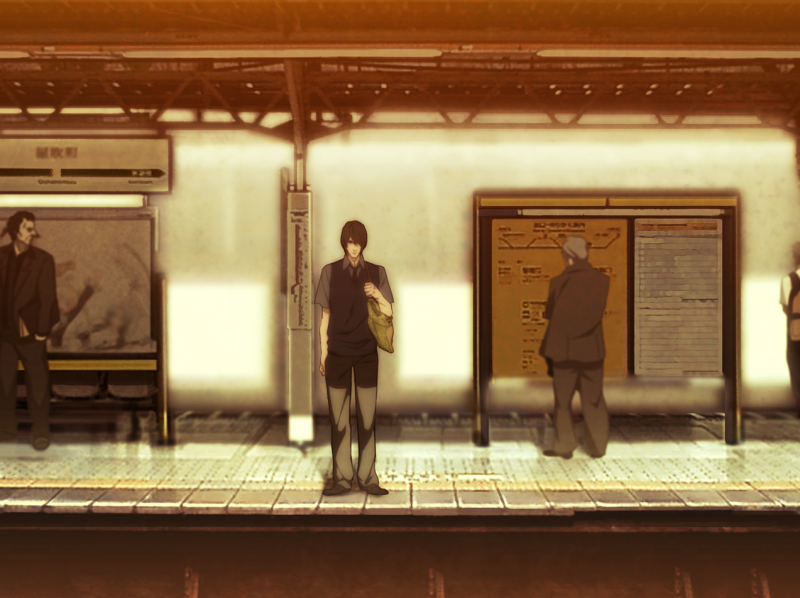
Game over.
Diving Deeper, a close reading
Well, guys, I knew it was going to happen, but guess who is beyond deep into her feelings about finishing this game? If you told me ten years ago that sweet pool would be getting an official English release and that I would have enough disposable income to purchase it, I would have died from the anticipation.
Damn, am I sad to say that my journey with sweet pool is finally over. It feels like I'm really shutting the door on one stage in my life by completing my playthrough, which is kinda what this game is about in the grand scheme. I'll elaborate.
As blogger Alice of Nitrochi-Paths points out and develops well in her own review, sweet pool can ultimately be read as an allegory for adolescence, menstruating meat and all:
[sweet pool is] a story that tells us in it's own fantastic way about the hardships of searching for our own identity and a place where we belong. About what it means to go through so [many] physical and emotional changes, to face the intensification of our desires and to cope with the expectations that befall on us once we leave our childhood behind.
Nitrochi-Paths, Boys, Interrupted: A Sweet Pool Review
As someone who literally grew up with this story, I wholeheartedly agree and picked up on this idea right away as I made my way through the narrative, secondhand through 4shiki and firsthand in my playthrough. It's undoubtedly a story about self-discovery, being at war with your body, becoming privy to new information as the adults around you recognize your maturity, and navigating intense interpersonal relationships—romantic, platonic, and familial.
However, to say that this story is commentary on the specific move from adolescence to young adulthood is a bit too limiting for me. Rather than accounting for this one transition in the game of life, I think sweet pool has much more in common with the Death tarot card, which is to say:
While we are more likely to encounter this level of change for the first time in adolescence, these dramatic transformations—specifically those that involve other people and how we change in relation and proportion to one another—happen throughout one's entire life. So, while on the surface sweet pool is set in adolescence and shows us examples of relationships that involve sex and/or romance, it's commenting on something much deeper and applicable to all different kinds of intimate relationships.
But I also want to take a bit of a step back to cover my past experiences with this story and why it appealed to me years ago, and to do that I need to choose a more relevant literary reference to my teen self. I promise it'll all come together.
Until the end of high school, when I realized that sweet pool also has a manga release, my only engagement with this game was through 4shiki's review, which in my mind was the funniest one she had written for her blog. And while I guess it's not PC by today's standards, I am still of the same opinion.
But as I kept returning to 4shiki's blog to have a few laughs re-reading her review, I started to focus a lot more on how much the story touched her on an emotional level—it quite literally drove her to tears. The level of poignancy and emotional depth that sweet pool was able to convey through her review despite its comedic tone began to resonate with me unironically. It seemed akin to Wuthering Heights in its depictions of deep emotional connection, which certainly grabbed my attention.
As I made my way through the actual game in the present, I remembered why I made this textual comparison in the past. I couldn't help but think of two iconic Wuthering Heights quotes as I played through a few of the routes. I was reminded of them on a literal and metaphorical level, so my close reading may be a bit dicey and hard to follow. My lead in might be literal but the reading itself might transition to the metaphorical, so yeah. Apologies in advance. We'll start with a hugely famous excerpt from novel:
My love for Linton is like the foliage in the woods: time will change it, I'm well aware, as winter changes the trees. My love for Heathcliff resembles the eternal rocks beneath: a source of little visible delight, but necessary. Nelly, I am Heathcliff! He's always, always in my mind: not as a pleasure, any more than I am always a pleasure to myself, but as my own being.
Catherine Earnshaw, Wuthering Heights, Chapter 9
This first one is easy to relate if we draw a comparison to "The Red Road" ending. This route takes the Christian concept of "becoming one" through marriage/baby making literally: Youji and Tetsuo have sex and die, leaving their child behind. Having children can certainly be a kind of ego death; there are many people whose entire lives and identities revolve around parenthood once they have children, plus children can be representative of a couple's love (or former love) by being the living manifestation of that time they once fucked sans protection.
But the "Nelly, I am Heathcliff!" comparison helps expand my reading beyond we are one through our children to something deeper. It's important to remember that when Youji and Tetsuo have sex in this ending, their bodies literally fuse or melt together to create their child, a grotesque metamorphosis that transforms their relationship into something all-consuming and ultimately destructive of the individual self.
Similarly, Catherine delivers her speech tortured and tormented by her feelings for Heathcliff instead of fulfilled by them. That depth of feeling—a love so deep that it's joyless or even painful, so deep that it collapses your identity or concept of self—is horrifying, just as we are horrified at the thought that Youji and Tetsuo are literally sticking together as they have sex. However, despite the terror of such a bond, it's also a rare, profound, and beautiful thing to be close to someone else on that level.
To stay completely on-brand, I'll plug a video essay that talks about the same kind of thing really quick because the phrasing is so much better than what I could write and fits perfectly. Wuthering Heights definitely works in this case, but Annihilation, the mainstream film, may be more recent in people's minds for commenting on this phenomenon. Nor do I blame anyone for not being on the 19th century women's fiction train. To pull from Folding Ideas, as I am wont to do:
Life changes us in unpredictable ways. We absorb our environments and the people around us and as horrifying as that sounds it's — "Nightmarish? Not always. Sometimes it was beautiful." And this is the note that Annihilation chooses to go out on, recognizing that there is an existential horror to the nature of intimate relationships, that opening ourselves to others, allowing them in, brings with it an annihilation of our singular self.
Dan Olson, Annihilation and Decoding Metaphor
But sometimes when we come together this way, we don't melt harmoniously or mutually into each other. We sometimes destroy other people with ourselves and, in so doing, lose ourselves in turn. This destruction of the other is not so much beautiful as it is lonely and cruel—not melting together, but rotting away. The endings "VLG" (Zenya) and "The Hunger" (Makoto) explore this concept. I'll be comparing this to a raw emotional outburst from Catherine's other half this time:
Catherine Earnshaw, may you not rest as long as I am living; you said I killed you—haunt me, then!
Heathcliff, Wuthering Heights, Chapter 16
This quote maps a bit easier over "The Hunger" because Makoto literally kills Youji in this ending. He is haunted by Youji while he is still alive because he does not requite his love. Even still, he begins to eat Youji (in Japanese "eating" is a euphemism for sex, just like eating is a common metaphor for [oral] sex in English), but his hunger for Youji does not abate. This "eats away" at Youji and he obviously dies at some point, after which Makoto keeps feasting on his corpse. Eventually, the body itself is gone and to alleviate his hunger for Youji and the regret over his own actions, Makoto begins to self-destruct (i.e. eat himself). His hunger for Youji haunts him until he is no longer the Makoto he was before.
We can read Zenya's ending as the flip side of Makoto's ending. While we get insight into the experience of the person that destroys another during Makoto's route, in Zenya's route we get a glimpse into the experience of the person who is destroyed. Zenya serially rapes Youji—taking from his body in a more metaphorical sense, but also not really—and we watch as Youji loses his sense of reality, personal agency, and will to live. He is a shell of his former self, waiting and willing for the relationship to end through his death. He is content to lose himself while Zenya becomes so empowered by the experience that he embodies the very thing he hates, a slave to his meat parasites. And we know once Youji dies that the temporary purpose he's found in making "babies" will disappear and his hunger for Youji will haunt him as well.
Well, I hope that made sense! And what of the other endings? I'll stop making intertextual comparisons because you probably get it at this point—this shit is heavy and something more often encountered in things like capital "L" literature. The remaining three ends are just as representative of deep emotional and interpersonal experiences, but deal more with drifting apart than staying together.
In "Diving Deep," Youji and Tetsuo are killed by Kitani before they can come together, in part because Youji hesitates but mostly because of the external force driving them apart. Many intense, mutual relationships end with this abruptness in real life—people fall out with one another, people are forced apart by sudden life changes or interference from outsiders, people die—but that doesn't diminish the power of the connection that was there, if for a brief moment. The two people involved will be drastically changed after relationships with sudden ends—think of death in terms of that tarot card again.
Similarly, in "Miracles May (Violin Version)," the subtextual story is that of a relationship on life support. The miracle is that Youji and Tetsuo are still together when they probably shouldn't be; he has clung to the relationship due to what he and Tetsuo had before the failed ritual at Komanami Academy, but he should have left long ago. That does not mean he doesn't appreciate the time he's spent with Tetsuo, but it needs to end. And on the other side, they will both be forever altered, their former selves but a memory. If you were to sum this ending up in a sentence, it would probably be "first loves never last."
We're concluding this section with "Miracles May," not only because it is the "true" ending of sweet pool (at least to me), but because it is indicative of the most common and tragic end to some of our deepest interpersonal relationships in life. Right now is a good time to remind you that while the story of this game lends itself easiest to commentary on romantic relationships, its messaging is also applicable to platonic and familial relationships.
So, as myself and fellow young millennials slash old Gen Z cuspers (i.e. the mid- to late 90s babies) have aged up, I've noticed our posts on social media and personal discussions with friends have started to get a little bit meta. In many cases, this "getting meta" results in freak outs over the fact that we are indeed aging—that the pop culture of our past is increasingly irrelevant, that our baby cousin who was born after 9/11 is going to college all of a sudden, et cetera. But ever so often we hit on deeper shit, like reflecting back on the people we once knew, what they meant to us in the recent past, and why we're not in touch anymore.
A few weeks ago, a stray Tumblr post on this subject reached my dash and I couldn't help but think of it as I was driven to tears of my own during the "Miracles May" credit roll. I've been trying to find this post for a direct quote for days, but haven't been successful. From memory, the post discusses its author's experiences with severe depression and/or a breakup during high school. They talk about how on the night of their prom, they holed themselves up in their room and resolved not to attend the event, which for Americans is like the zenith of your mandatory school days. One of their friends drove over to their house, comforted them, dolled them up, and took them to prom for a fun evening with friends anyway.
The author reflects on how much that meant to them at the time and the level of intense care and love that it took for their friend to perform those actions. While the bond described in the anecdote might indicate that the two are still friends if not best friends to this day, the post was actually about people who have touched us deeply—even saved us—and how they disappear from our lives as easily as acquaintances or strangers. The author was almost in awe that someone so integral to her life just a short time ago was no longer there. And this concept is what sweet pool is about on a fundamental level.
I feel very blessed to have played "The Red Road" and "Miracles May" back to back because the contrasting attitude to the idea of "forever" or "eternity" in these two endings is what made everything click for me. In the former ending, we get the argument that eternity doesn't exist:
Tetsuo: "…You think maybe there's such a thing as forever?"
Forever. He could have sworn he'd asked the same thing, once. But he couldn't remember. His mind, like his body, was melting away. Forever. Together for all eternity. If only it were possible. If only their souls could stay together, he'd want for nothing more.
Youji: "… No. There's no such thing."
Tetsuo: "… Yeah, you're right. Nothing lasts forever."
Forever was merely a fantasy. That was why it shone so bright. He and Tetsuo… What they'd shared… These things existed only in the moment. This moment was more precious than anything.
The final text of this ending paradoxically re-introduces the fact that the two will be together in death and maybe beyond death, but in the next breath describes a wordless exchange between our heroes in which they both recognize that it is the beginning of the end. This shit is gut-wrenching… even transcribing it has me all torn up.
But this exchange is nothing in comparison to "Miracles May," which manages to be more gut-wrenching for its implication that Youji and Tetsuo will be together forever, just not in the literal sense.
This ending doesn't necessarily tell you that it's philosophizing over the concept of eternity in the same way as "The Red Road," so we have a little more legwork to do, even if it's light. These words are the last we hear from Youji:
For the briefest of moments, he'd known his father had saved his life. Thinking back on it now… his father must have been a Host just like him. Maybe it was his turn.
The instant the thought crossed his mind, his soul screamed.
—No! I want to live!
Even if this was destined to happen—
Even so, he wanted to live.
He wanted to be with Tetsuo.
He wanted to hear him call his name.
He wanted to hear that familiar voice, deep and softer than any other in the world.
—Please—one more time—
As we time leap with Tetsuo, we learn that the two are still together and will be for eternity if we read between the lines during his flashback memories of high school and eventually Youji:
A noisy classroom. Idle chatter. Chemistry experiments. Sandwiches from the school store. Weekly tests. Classmates clutching their hair in frustration. After-school plans. Local hangouts… the roof.
The faint smell of chlorine carried on a gentle breeze. Sitting against the safety fence.
He only ever brought a drink.
He wouldn't even accept a free sandwich.
A face beside his.
Dark hair.
Pale skin.
Distrustful eyes.
—Forever.
Tetsuo: "…Youji?"
God, I'm fucking choked up! But it's important that the last bit of the flashback itself ends on "forever" before Tetsuo fulfills Youji's wish by saying his name again. While one might be tempted to read the wish fulfillment here as the "end" of Tetsuo and Youji, this "Miracles May" is very ambiguous and open-ended, unlike "The Red Road" explicitly stating that it is "the beginning of the end." Tetsuo will always carry Youji with him, even if his literal memory of Youji remains buried for the rest of his days. His time with Youji made him into the "different" person he is in the present.
It's that Death tarot card again—the Tetsuo before these events was cold, distant, and lonely, but his relationship with Youji taught him the meaning of intimacy and changed him into the caring son that his mother doesn't really recognize. The Tetsuo that Youji knew died in that pool; their coming together brought about the complete transformation of his entire being. For that reason, Youji is woven directly into the fabric of Tetsuo's new identity; the two can never be torn asunder.
And while we're on the subject of death, it is actually ambiguous if Youji dies at the end of "Miracles May," at least in my opinion. The cult of The Liberated did not appear to have Men in Black amnesia-inducing methods to make people forget one specific aspect of a major event, nor would it be possible for them to kidnap Youji and sacrifice him since Zenya killed the husk of the other Purebreed. All that is to say is the world of sweet pool has fantastical elements, but the things that are actually possible is very similar to the real world.
Erika would have definitely kicked up a fuss if anything was afoot with Youji that she didn't know about, so if Youji wasn't counted among the dead at Komanami and Erika isn't launching a missing person report, then I think it's relatively safe to say that Youji is alive and moved away with Erika and his brother-in-law… maybe one of them got a job in a different prefecture, or they had to relocate due to the financial burden of Youji's hospital fees.
Sure, Youji's ability to recover from a level of bodily trauma that almost killed Tetsuo seems unlikely since Youji is notoriously frail, but let me fucking have this! I don't even want it because there's potential for Tetsuo and Youji to actually be together in their 20s. If Youji did die, it's in the same way as Tetsuo—a transformation of his entire being through the intimacy of their relationship. The two are together forever in spite of (or maybe even because of) the ephemeral nature of their relationship.
The idea of temporality as it relates to our emotional connections with others comes up in the tagline for the whole game:
「恋ではなく、愛でもなく。 もっとずっと、深く、重い
"It's not romance, it's not (true) love. It's something more forever, deeper, weightier."
As my sister was explaining why translating this was a bit tricky to her, the idea of time came in automatically, which really fucking excited me. The fact that she would translate the tagline with "forever" without prompting from me practically had me bouncing in my seat. She explained that koi (恋) and ai (愛) are both commonly translated as "love," so the difference between the two comes down to what you feel is most appropriate in the given context. A lot weebs already know this, but she elaborated that koi is usually something temporary and focused on the individual, but that ai is forever love.
Again, I feel very blessed to have played sweet pool in the order that I did because it feels in retrospect that I progressed through what the tagline is talking about. The first four endings—"VLG," "The Hunger," "Diving Deep," and "Miracles May (violin ver.)"—are showing us what koi is all about. Then you get to "The Red Road," which gives you a little taste of ai—forever, but not quite. "Miracles May" is the only thing that dives deeper, that is more forever than forever love; it's an interpersonal bond that is baked into every fiber of your being, even when you're all alone.
We all have connections like Youji and Tetsuo, like the author of that Tumblr post, like the stories our parents, grandparents, and great grandparents tell us of the companions from their youths. These are stories of deep intimacy that people carry with them always—perhaps the name evades them, but "I can still see their face" is a common mantra. The fact that the last visual we get in sweet pool is Youji in his high school uniform on the train platform does not mean we are seeing a ghost, nor do I really hold with 4shiki when she says it's supposed to underscore what Tetsuo has lost…
That final snapshot of Youji as a high school student is Tetsuo's memory of Youji as he travels farther away from him in space and time. While the name comes to him before he gets on the train, we know this is the last time Tetsuo will say it… Youji's name may be foreign or forgotten, but—
He can still see his face.
My Busted Opinion
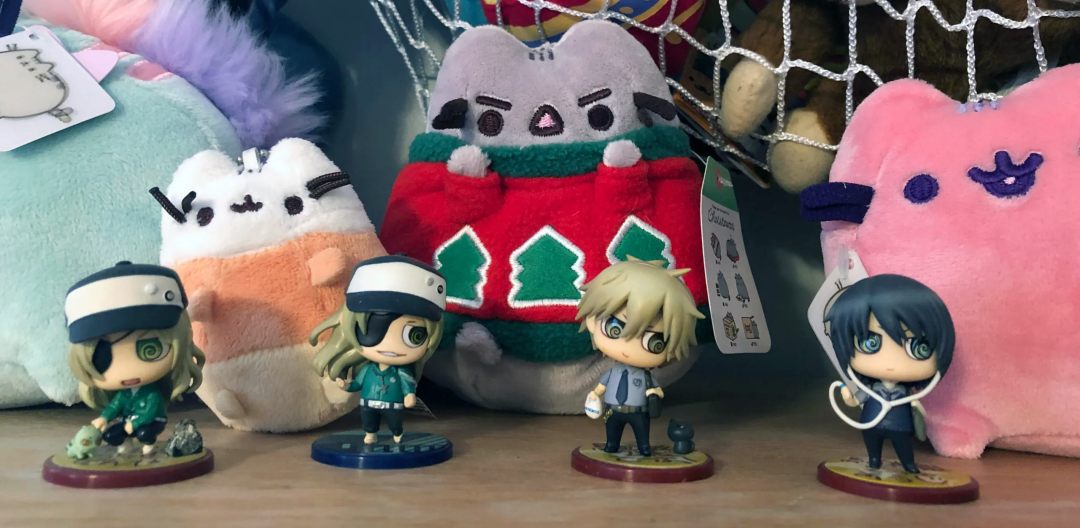
What else can I say besides y'all need to play this game? Okay, clearly I can say a lot (scroll down more if you dare!) but you really do need to play it. I'm not one to pressure people to spend their coin or engage with media that incorporates non-consent, but seriously this game is well worth the $25.00 that I paid for it. And if you don't have $25.00… idk come over my house and play this shit because its story is fucking riveting as all hell. I have not stopped thinking about this thing since I finished Miracles May
and that was at least two or three weeks ago at this point!
Obviously, I think sweet pool is doing some deep shit here despite being a porno in which a guy shits meat all over his high school. Teenagers will definitely find moments and/or characters to relate with during the playthrough, since the text really wears its messaging about puberty and adolescence on its sleeve:
He'd been afraid of his changing body, afraid of living in solitude. The people around him had seemed so cold and hostile, like they would cut him if he got too close.
Youji: Can you understand how miserable it is? How terrifying? It feels like you're going crazy. Like everyone is normal but you. And you start to think that soon, they'll leave you behind, and you'll be all alone in your fucked-up head. Can you imagine how that feels?
If that's not quintessential teen angst right there, then I'm really out of touch and no longer have any idea what it is.
Depending on where you're at in the game of life, you'll probably identify more strongly with different characters, which is always fun. While I can't say I've ever made someone lick my eyeball as a show of loyalty, Zenya's shitty attitude, eccentricities, poor taste, and cramps so bad they're incapacitating are spot on teen me. He's half mad, everyone thinks he's weird as fuck, and despite being wrongfully blamed for shit all the time, he actively participates in and even instigates huge fights in the household… boy, was that my ass. I think I may have had a sense of this kinship even as a girl, which is probably why I ended up with two Zenya figurines.
Don't get me wrong—I've always been a Tetsuo stan, but Zenya is an objectively compelling fictional character with an eye-catching (😉) design. It's a pity his ending is so horrifying to live through, but we can't really complain since a huge part of his characterization is inflicting his pain on everyone else, so it does make sense.
However, now that I'm a bit older, I relate to Tetsuo so fucking hard in both Miracles May endings. I know what it's like to take care of a loved one who's ill or dying right up until the point they pass away. After my grandma passed, I was really fucking lost having no one to care for—being a caregiver had become a part of my identity and was really integral to showing my love by that point—so I can preemptively relate to what he's about to go through after the Violin Version ending. We've more than covered how the true ending resonated with me, so we don't need to go there again.
As for Makoto… Hated his annoying ass more than anything, even if Zenya's ending was worse. He's a little shit with an entitlement problem and severe nice guy tendencies. I know Youji isn't the easiest guy with whom to communicate, but it's a two way street. He had a lot of inner monologuing and conflict about how he wanted Youji to open up and for them to be real confidantes and shit with one another, but he never tried to have a heart to heart conversation with Youji where he explicitly stated that desire??? Throwing a temper tantrum and dripping water all over your friend's foyer doesn't fucking count!!! I warmed up to him after he cries in the hospital but yeah that was definitely not enough to make up for his bullshit imo. Can't even say his cannibalism was the grossest thing about this game either because The Red Road
melty sex exists and I saw Zenya's guts on the floor, sooooo.
Youji is an absolute delight—I mean, instant heart eyes for anyone whose predominant energy is don't sit next to me on the bus,
am I right? I will admit that the level to which he was emotionally closed off was hard to deal with as someone who's always been a chronic oversharer. Not to mention the fact that he's casually failing all his classes and giving my overachiever ass fucking anxiety because of it, but he's a sweetheart and I love him. His relationship with his sister was genuinely touching and his reaction to seeing a picture of his baby nephew was so charming. Mad respect for an uke who fights back, doesn't take any shit, and calls it like he sees it, too. While I definitely would have called the police after Tetsuo touched my butthole without consent in the boy's bathroom, I'm not ever here for victim-blaming so like, I'll allow it. People don't believe victims in those situations anyway—just ask the admin of my public school district—so I get it. I loved playing mostly from his POV and I don't really think there's much else to say about that.
Pretty neutral on Kitani, but I must say his tragic backstory (which I didn't get into here) was so over the top while also being non-descript that I felt like I was reading a damn Hannah Howell romance novel during his flashback scene. I low-key kind of hate him though for not sending Kunihito into that good night. Kunihito caused 100% of the problems in the Okinaga household and he still had the nerve to blame shit on Zenya. At the very least Kitanti should have let the Okinaga-gumi take care of Kunihito because he needed to be stopped, like, right after he started communicating with the meat bitches. Swinging back to Kitanti because Kunhito is so cancelled he shouldn't even be discussed, I also just want to know how Kitani let things progress to periodically licking his young master's eyeball? Like what was the build up to that? We need answers, Kitani!
Kamiya can kiss my whole asshole because he's a fucking pervert… like I know he's trying to get Youji and Tetsuo to fuck because of the cult or whatever, but you can tell that he's super into his students meeting up to have sex on another level. Plus every time he was on screen, I always went to grab some LED cleaner for my computer because his lab coat is fucking filthy and made me think I had some shit on my screen. Every. Fucking. Time. Anyone who comes for Zenya for no reason can catch these hands, too. Someone needed to take him out and I'm pissed he didn't die in any of the endings.
What else? Soundtrack was gorgeous and made me feel feelings—it's going to be a while before I can go back and revisit some of those songs without crying my eyes out. Art was downright incredible… There are some moments where the guys look pretty, but it's in a decidedly male way—they're sinewy and masculine and that's refreshing if you like the aesthetic of your heroes to give you a little more verisimilitude in comparison to your standard bishonen.
Anything with Christian semiotics or theology is going to grab my Mexican Catholic attention as well, so that was great. It really justifies all of the flesh stuff and eating someone's body as a show of worship… I mean, it's gross but I was like I see you out here doing a Christian thing, bb!
If you actually put any effort into creating save files and strategizing your routes out beforehand, it's not a super long game either, so you don't need incredible amounts of stamina and time to get the full sweet pool experience. I'm very grateful that this was my initiation into BL games because it was really easy to manage—when I fucked up the save file situation, I knew where I went wrong instantly. In the grand scheme I'm not mad that my dumbassery made my playthrough experience a million times longer than was necessary because this game ended up doing, saying, and meaning a lot more to me than I could have ever imagined when I bought it.
My overall assessment: talented, brilliant, incredible, amazing, show stopping, spectacular, never the same, totally unique, completely not ever been done before, unafraid to reference or not reference, put it in a blender, shit on it, vomit on it, eat it, give birth to it.
Conclusions
In my Merry Checker review, I concluded by underscoring its idea of an "adult's youth" as a way to say that what I'm doing on this BLog is embracing a huge part of my teenage life with a new joie de vivre slash without all the internalized shame—you get it. I want to revisit the topic again here because I think that completing sweet pool has finally made me feel like I've fully entered my adulthood. Hence the title of this review—the bells are definitely a-tollin' on my youth, but I'm not mad at it. I'm truly in the throes of my adult's youth and I couldn't be happier.
Like a lot of twenty-somethings, it's really common to have imposter syndrome about being a "real" adult—that's unfortunately why the cringe term "adulting" took off a little ways back—and a lot of that insecurity comes from not being adequately prepared for daily life by school and our parents and/or not able to access markers of adulthood due to stagnant wages and high rent. As a result, we lack rites of passage as the idea of young adulthood expands and shifts with economic conditions and what have you.
For this reason, we drift from our late teens into our twenties with nothing to definitively tell us "hey, this right here is what makes you an adult." But instead of being a wholly bad thing, I think that all of us coming of age right now will probably have our own a-ha moments that signal a transition away from youth into adulthood that are not constrained by age, time, or cookie-cutter landmark moments. Mine just so happens to be playing a gay porn game—go figure.
I've already done the absolute most in this review and I'm actually worried that people will think I'm performing or playing up how deep or impactful this game was to me as a way to develop my brand or something, but everything about my consumption of this game smacks of adulthood to me. I bought the game with my own coin, live by myself so I didn't have to wear headphones while playing, and I've lived enough adult experiences to be able to do a reading like the one in the Diving Deeper section of my plot summary.
The fact that my response to the story is fundamentally different from my former self—a girl from whom I already feel a sense of alienation—is just checking off a lot of boxes for me. While I'm not above intellectualizing trash and I do like fake-deep readings of garbage media, all I can say is that everything written here is completely genuine. Y'all really need to fucking play this shit and maybe you'll get it maybe you won't but uhhhhh the minds of its creators are SO powerful.
I've already gone and purchased Togainu no Chi from JAST USA. I have a history with this game as well—like I do with all of Nitro+Chiral's back catalog—but it's nowhere near sweet pool in being dear to my heart. My nostalgia for Akira et al. comes more from the fact that it was the only game my sister and I went onto Aarinfantasy to download and try to patch into English, not because the story really resonated with me or anything. Just based on the sheer number of cursed routes I've already had to play through just to get to Shiki, I can already predict my future review of Togainu no Chi ain't going to be this glowing. Never say never, but my muses aren't sending me the signals that a deep close reading is in order, so your future attention spans will be a little more blessed.
Hats off to you if you managed to read this one from beginning to end.
xoxo shio
Notes
References
sweet pool [EN] available on JAST USA (18+ and DRM-free) and Steam (censored by default)
Brontë, Emily. Wuthering Heights. E-book, Project Gutenberg, 1996. https://www.gutenberg.org/files/768/768-h/768-h.htm. Last accessed 19 April 2022.
NITRO+CHIRAL PATHS [Alice]. "Boys, Interrupted: A sweet pool Review." Tumblr, 21 June 2014, https://nitrochi-paths.tumblr.com/post/89417975478/boys-interrupted-a-sweet-pool-review. Last accessed 19 April 2022.
Olson, Dan. "Annihilation and Decoding Metaphor." YouTube, uploaded by Folding Ideas, 31 October 2018, https://www.youtube.com/watch?v=URo66iLNEZw.
Post History
This post was migrated from WordPress to a static site in October 2022, converted from my whack ass hub formatting back to a single post in March 2025, then adjusted to version 3.0 formatting in May 2025. I have made minor grammatical changes, removed pictures that didn't add anything to the text, and placed the plot summary inside a details element during the these transition periods.




